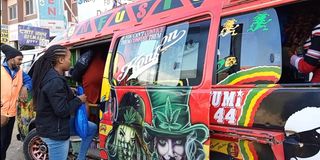From 'Garang' to WiFi rides, a throwback to Nakuru's old-school matatu days

Konfusion from Uchumi 44. It is among the latest vehicles in Nakuru that has been highly customized.
I would be lying if I said that the Nganya culture in Nakuru was on par with Nairobi city. Honestly, we don't even come close, but at least we're making progress.
For me, the concept of the Nganya culture in Nakuru really took shape around 2009. I remember that, when I was growing up in Langa Langa, we had some of the best matatus. The most famous one was nicknamed 'Garang'.
Ladies and gentlemen, that was the first time I had ever seen a screen in a matatu. The music coming from the matatu was deafening, to say the least. I don't know if it's just me getting old, but currently there is no PSV that comes close to that one.
A few days ago, when I was coming back home, I boarded a matatu and managed to sit next to the driver. We got talking. He ranted about the increase in fuel prices, and we exchanged opinions on how some government officials should only serve one term.
Suddenly, a pimped-up matatu passed by, and our conversation took a whole new turn. He told me that he had been a matatu driver for 30 years.
"Back in my day, we only had one radio and we would play gospel music all the time. After a long day, there was no need to make noise for people who had spent the whole day working," he says.
After that, he decided to give me a free history lesson.
"The reason these vehicles are called matatus is because during the colonial and post-colonial periods, Kikuyu people used to board the bus and pay 30 cents (magoro matatu)," he explained, laughing.
The matatu business has kept him afloat and provided a livelihood for his family for the last 30 years.
According to David, there was high discipline among PSV drivers and road carnage was not as high in the 90s and early 2000s.
However, he acknowledges the changing times and says that every generation has its own way of doing things.
Moses Kingori has also been a driver for the past 26 years, and his fondest memory is of a time when the fare for travelling from Town to Mawanga was as low as Sh25.
"I have seen how the matatu culture in Nakuru has evolved over time. For me, the turning point was when the Michuki rules were enforced. There was some resistance at first, with matatus even going on strike, but in the long run it made the roads safer. You would never see these pimped cars in Nakuru, but after a while people started to like them a little,” says Moses.
Unlike David, who clearly did not appreciate the concept of pimping matatus, Kingori says their work is customer-oriented.
"Matatu culture seems to resonate most with the youth over time, so people want to pimp their matatus to attract them. Nowadays, some even have WiFi, so I think it's all about meeting the needs of your clientele," he says.
Let us know on our socials: 'Matatu gani sahi ndio ngori Nakuru'.
